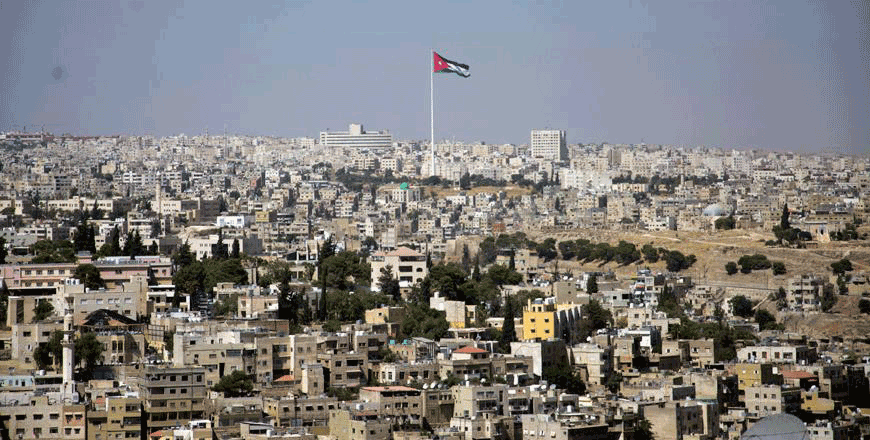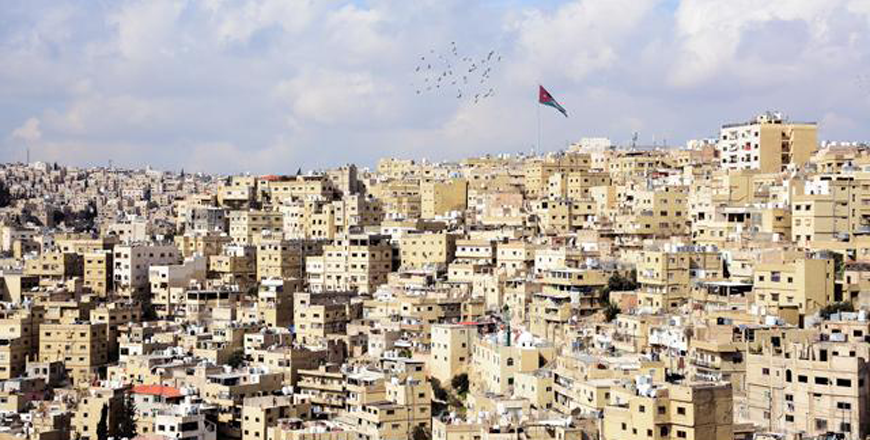You are here
IMF staff reach staff-level agreement with Jordan on 5th review under EFF
By JT - Nov 15,2022 - Last updated at Nov 15,2022

This file photo taken on January 26 shows the seal for the International Monetary Fund in Washington, DC (AFP Photo)
AMMAN — An International Monetary Fund (IMF) mission led by S. Ali Abbas, reached a staff-level agreement on the fifth review of the authorities’ economic reform programme supported by the Extended Fund Facility (EFF) arrangement. This agreement is subject to approval by the IMF’s management and the Executive Board, according to a statement from the IMF.
At the conclusion of the discussions, Abbas issued the following statement:
“Despite turbulent global economic conditions, sound fiscal and monetary policies have helped maintain macroeconomic stability and access to international markets. The central government is expected to narrow its primary deficit (excluding grants) by 0.7 per cent of GDP to 3.7 per cent of GDP in 2022, with larger-than-expected fuel and food subsidy costs being offset by a rationalization of non-priority spending and a significant revenue overperformance.
“The latter reflects the government’s ongoing institutional and legislative efforts to tackle tax evasion and avoidance. The Central Bank of Jordan has increased interest rates in line with the US Federal Reserve policy rate in order to safeguard the peg; international reserves have remained adequate.
“The post-COVID recovery continues to build momentum, with real GDP growth expected at around 2.7 per cent in 2022, revised up from 2.4 per cent at the last review, due to increased tourism arrivals and positive regional spillovers from GCC countries. Growth in the medium term is expected to reach 3 percent, but there are downside risks from a slowing global economy. Unemployment has edged down slightly but remains very high at 22.6 per cent, particularly among the youth and women. Inflation has increased to 5.2 per cent as of end-October, reflecting the pass through of higher fuel and food prices, though this remains moderate by global comparison. The stronger-than-expected rebound in tourism receipts and robust exports, have been offset by a higher food and fuel import bill, resulting in expectations for a somewhat higher current account deficit of 7.8 per cent of GDP for 2022.
“Fiscal reforms will continue to center on broadening the tax base. The recent passage of legislations unifying the tax and customs administrations in ASEZA with national systems, introducing place of taxation rules in the GST law, and strengthening the governance of fiscal incentives for investment constitute important reforms in this regard. The phasing out of untargeted fuel price subsidies, while protecting the vulnerable against higher prices through additional cash transfers, is welcome as it saves precious resources for priority spending.
“Jordan maintains healthy wheat and barley reserves, although the government has shouldered a heavy fiscal burden in subsidizing these commodities, in the face of a surge in international prices. Agreement was reached on the 2023 fiscal targets, aiming for a central government primary deficit (excluding grants) of 2.9 per cent of GDP, which balances the need to support the recovery and debt sustainability imperatives, against the backdrop of extraordinary external pressures. The authorities have reemphasised their strong commitment to fiscal prudence in order to reduce public debt to 80 per cent of GDP by 2027.
“Monetary policy should continue to be anchored in safeguarding the peg which continues to serve the economy well. As the US Federal Reserve tightens policies, the Central Bank of Jordan (CBJ) has acted firmly and swiftly to maintain monetary stability and raised policy rates in line with the Fed. The CBJ will continue to undertake the necessary monetary policy adjustments in response to Fed actions, backed by adequate international reserves, which serve as a critical buffer in a highly uncertain external environment.
“In particular, the CBJ will remain alert to changes in domestic, regional, and global financial conditions, and stands ready to undertake the policy adjustments necessary to credibly protect monetary and financial stability. The banking system remains well-capitalised and liquid, and non-performing loans have remained at low levels. The ongoing Financial Sector Assessment Programme (FSAP) provides a timely opportunity to conduct a comprehensive assessment of the financial sector and its resilience. The authorities continue to work actively to ensure effective implementation of the Financial Action Task Force (FATF) recommendations.
“The electricity sector faces significant financial challenges against the headwinds from higher international oil and gas prices. While the long-term gas import contracts for electricity generation have mitigated the impact of surging global natural gas prices, NEPCO’s deficit has increased in 2022, including due to reductions in the bulk supply tariff paid by distribution companies. With the oil shale power purchasing agreement (PPA) coming on stream, NEPCO’s financial balance will come under further stress next year.
“The authorities are preparing an action plan to decisively address NEPCO’s financial challenges, in collaboration with development partners. Regarding the water sector, the Cabinet’s approval of a financial sustainability roadmap for the sector is an important step for addressing water scarcity, while containing the sector’s deficits and eliminating arrears.
“The prospects for strong, durable and inclusive growth rest on steady progress on structural reforms to boost female and youth employment; enhance labor market flexibility; promote competition; and enhance governance and transparency. In this regard, passage of the tabled labor law amendments, strengthening of the competition framework, and improving national statistics to monitor progress remain critical.
“Completing this review will bring total IMF disbursements over 2020-24 to SDR 1,438 million (or around $2 billion). This is in addition to SDR 329 million (or $469 million) disbursed as Jordan’s share under the IMF General SDR allocation in August 2021. Robust concessional support from donors remains crucial, including to help Jordan continue to bear a disproportionate burden in supporting and hosting 1.3 million Syrian refugees.
“The mission would like to thank our counterparts for a collaborative and fruitful dialogue. A wide-ranging set of meetings was held with the Prime Minister, Deputy Prime Minister for Economic Affairs, the Minister of Finance, the Minister of Planning and International Cooperation, the Minister of Energy and Mineral Resources, the Minister of Industry and Trade and Labor, the Governor of the Central Bank of Jordan, other senior cabinet ministers and officials, donors and representatives from the private sector and civil society.”
Related Articles
AMMAN — International Monetary Fund (IMF) staff and the government have reached a staff level agreement on the second review with Jordan und
AMMAN — The Executive Board of the International Monetary Fund (IMF) on Wednesday completed the fifth review of Jordan’s programme supported
AMMAN – A mission from the International Monetary Fund (IMF), led by Martin Cerisola has recently, concluded a visit to Jordan, where it dis













